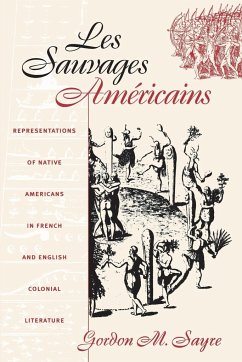
Les Sauvages Américains
Representations of Native Americans in French and English Colonial Literature

PAYBACK Punkte
25 °P sammeln!
Algonquian and Iroquois natives of the American Northeast were described in great detail by colonial explorers who ventured into the region in the seventeenth and eighteenth centuries. Beginning with the writings of John Smith and Samuel de Champlain, Gordon Sayre analyzes French and English accounts of Native Americans to reveal the rhetorical codes by which their cultures were represented and the influence that these images of Indians had on colonial and modern American society. By emphasizing the work of Pierre Franáois-Xavier Charlevoix, Joseph-Franáois Lafitau, and Baron de Lahontan, am...
Algonquian and Iroquois natives of the American Northeast were described in great detail by colonial explorers who ventured into the region in the seventeenth and eighteenth centuries. Beginning with the writings of John Smith and Samuel de Champlain, Gordon Sayre analyzes French and English accounts of Native Americans to reveal the rhetorical codes by which their cultures were represented and the influence that these images of Indians had on colonial and modern American society. By emphasizing the work of Pierre Franáois-Xavier Charlevoix, Joseph-Franáois Lafitau, and Baron de Lahontan, among others, Sayre highlights the important contribution that French explorers and ethnographers made to colonial literature. Sayre’s interdisciplinary approach draws on anthropology, cultural studies, and literary methodologies. He cautions against dismissing these colonial texts as purveyors of ethnocentric stereotypes, asserting that they offer insights into Native American cultures. Furthermore, early accounts of American Indians reveal Europeans' serious examination of their own customs and values: Sayre demonstrates how encounters with natives' wampum belts, tattoos, and pelt garments, for example, forced colonists to question the nature of money, writing, and clothing; and how the Indians' techniques of warfare and practice of adopting prisoners led to new concepts of cultural identity and inspired key themes in the European enlightenment and American individualism.













